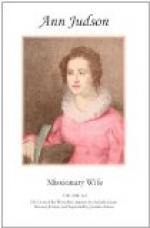Their system of balancing evil with good, reduces all sin to a thing of little importance. “If any man sin” in Burmah, his religion tells him of no “advocate with the Father” on whose altar he may lay the tribute of a believing, penitent, obedient and grateful heart; but instead, it tells him he may repeat a form of words, he may feed a priest, he may build a pagoda, he may carve an idol, and thus balance his iniquity with merit. If any man suffer in Burmah, his religion points him to no place where “the wicked cease from troubling, and the weary are at rest,” and where “God himself will wipe away all tears from all faces;” but it dictates a proud submission to unalterable fate, and flatters him that his sufferings here may purchase immunity from torment in some unknown future existence; and finally if any man die, in Burmah, his religion tells him of no Saviour who has “passed through the grave and blessed the bed,” and “swallowed up death in victory;” but it threatens degradation, perhaps into a soulless brute; or at best, a place of expiatory misery;—in short, “living or dying,” the Burman may be said emphatically to be “without hope, and without God in the world.”
Such was the stupendous system of superstition and ignorance, which two feeble missionaries armed like David when he met the Philistine with “trust in the Lord his God,” ventured to attack, and hoped to subdue.
CHAPTER V.
RANGOON; LETTERS FROM MRS. JUDSON.
Rangoon, one of the chief seaports of the Burman Empire, situated on one of the numerous mouths of the Irrawaddy, and having a splendid harbor, is yet one of the meanest, and most uninteresting cities that can well be imagined. It is situated in a flat, marshy plain, and is merely a vast collection of bamboo huts, with narrow streets, and here and there an ugly building of brick or wood, and would give a stranger a most unfavorable impression of the noble country to which it is the entrance.
On their arrival at this city, Mr. and Mrs. Judson took up their abode in a deserted mission-house just outside the wall, which had formerly been occupied by some Baptist missionaries from Serampore. The house was large and not unsuited to the climate, but unfinished and comfortless. However, it had a garden full of flowers and fruit-trees, and the scenery around it was rural and pleasant. Here they found one Christian female, the only person remaining of the former mission family, and she was a native of the country. Mrs. Judson’s peculiar trials and encouragements at this time will be best learned by extracts from her letters and journal.
July 30, 1813, she writes: “We felt very gloomy and dejected the first night we arrived, in view of our prospects; but we were enabled to lean on God, and to feel that he was able to support us under the most discouraging circumstances.




